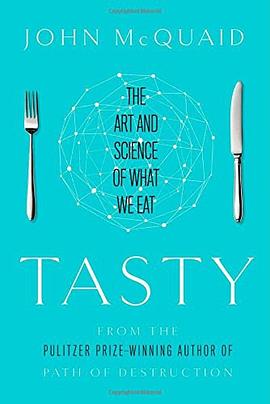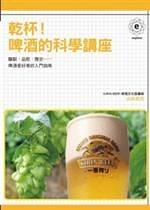
具体描述
A fascinating and deeply researched investigation into the mysteries of flavor—from the first bite taken by our ancestors to scientific advances in taste and the current "foodie" revolution.
Taste has long been considered the most basic of the five senses because its principal mission is a simple one: to discern food from everything else. Yet it's really the most complex and subtle. Taste is a whole-body experience, and breakthroughs in genetics and microbiology are casting light not just on the experience of french fries and foie gras, but the mysterious interplay of body and brain.
With reporting from kitchens, supermarkets, farms, restaurants, huge food corporations, and science labs, Tasty tells the story of the still-emerging concept of flavor and how our sense of taste will evolve in the coming decades. Tasty explains the scientific research taking place on multiple fronts: how genes shape our tastes; how hidden taste perceptions weave their way into every organ and system in the body; how the mind assembles flavors from the five senses and signals from body's metabolic systems; the quest to understand why sweetness tastes good and its dangerous addictive properties; why something disgusts one person and delights another; and what today's obsessions with extreme tastes tell us about the brain.
Brilliantly synthesizing science, ancient myth, philosophy, and literature, Tasty offers a delicious smorgasbord of where taste originated and where it's going—and why it changes by the day.
作者简介
John McQuaid has written about city-destroying super-termites, the slow collapse of fishing communities, hurricane levee engineering, mountaintop removal coal mining, and the global flower business for various publications, including Smithsonian magazine, The Washington Post, Wired, Forbes.com and EatingWell magazine. His work has won a Pulitzer Prize, as well as awards from the American Association for the Advancement of Science, the American Institute for Biological Sciences, and the International Association of Culinary Professionals. He lives in Silver Spring, Maryland, with his wife, son and daughter. The struggle to satisfy and understand the kids' strange and contradictory food choices (the elder liked super-hot peppers and limes, the younger rice, pasta and cheese) was the inspiration for his book Tasty.
目录信息
读后感
众所周知,饮食在我们的生活中占据着不可替代的重要作用,所谓民以食为天。如今,遍布城乡的各种大大小小的餐馆、饭店,花样繁缛的各色菜系,色、香、味、形俱全的菜肴琳琅满目,令人大有应接不暇之感。饮食的影响无所不在,人们于路上相遇,每每一句:“吃了吗?”简...
评分多少个回合的被吐槽加自嘲?“吃货”这个称号终于变成了一个中性词。尽管如此,“人”被一个“货”字指代,其中的奚落和不屑还是显而易见的。其实,不待见好吃的人,并不始于“吃货”这个词诞生时,“好吃懒做”这个固定搭配也许没有进入现代汉语词典,可是,我小的时候它就已...
评分 评分总听人说,吃货有义务比普通人更有文化。但说到有文化,谁也比不上麦奎德这位学术派吃货。 约翰·麦奎德毕业于耶鲁大学,曾在《史密森杂志》《华盛顿邮报》《连线》等著名杂志上发表文章,他的作品还拿过美国科学促进会、美国生物科学协会和国际专业烹饪协会的大奖。 emmm……...
评分总听人说,吃货有义务比普通人更有文化。但说到有文化,谁也比不上麦奎德这位学术派吃货。 约翰·麦奎德毕业于耶鲁大学,曾在《史密森杂志》《华盛顿邮报》《连线》等著名杂志上发表文章,他的作品还拿过美国科学促进会、美国生物科学协会和国际专业烹饪协会的大奖。 emmm……...
用户评价
初看标题以为总归会虐心虐胃 实则更多是从神经科学/心理学/社会学角度讲述人类饮食习惯与口味喜好的演变 里面的科学小故事都很有趣哇!
评分初看标题以为总归会虐心虐胃 实则更多是从神经科学/心理学/社会学角度讲述人类饮食习惯与口味喜好的演变 里面的科学小故事都很有趣哇!
评分初看标题以为总归会虐心虐胃 实则更多是从神经科学/心理学/社会学角度讲述人类饮食习惯与口味喜好的演变 里面的科学小故事都很有趣哇!
评分初看标题以为总归会虐心虐胃 实则更多是从神经科学/心理学/社会学角度讲述人类饮食习惯与口味喜好的演变 里面的科学小故事都很有趣哇!
评分初看标题以为总归会虐心虐胃 实则更多是从神经科学/心理学/社会学角度讲述人类饮食习惯与口味喜好的演变 里面的科学小故事都很有趣哇!
相关图书
本站所有内容均为互联网搜索引擎提供的公开搜索信息,本站不存储任何数据与内容,任何内容与数据均与本站无关,如有需要请联系相关搜索引擎包括但不限于百度,google,bing,sogou 等
© 2026 qciss.net All Rights Reserved. 小哈图书下载中心 版权所有





















